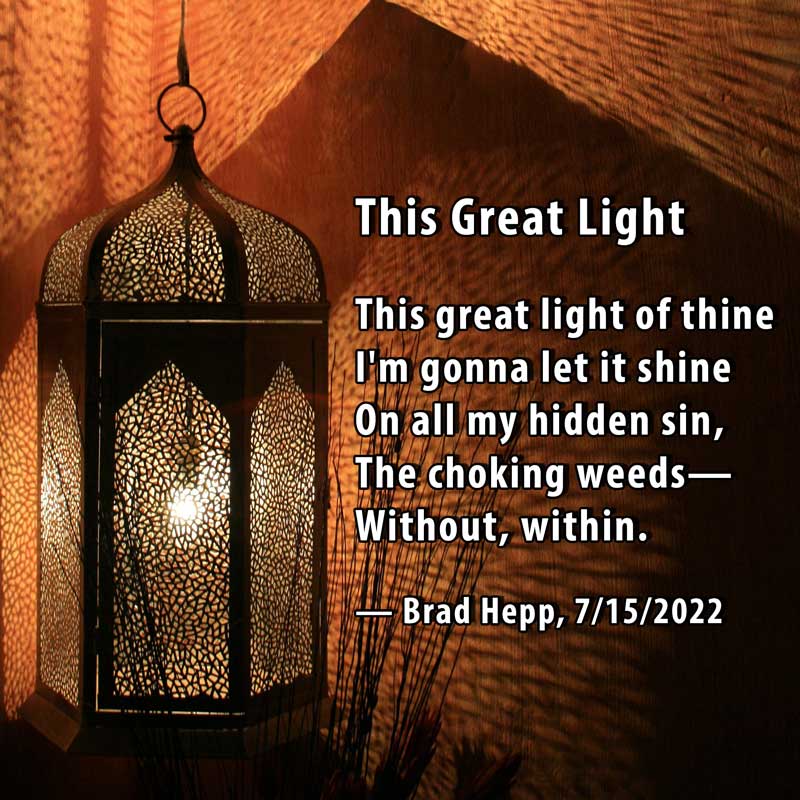
Commentary
KEEP THE LIGHT ON
[NOTE: Luke 8:4-18 has far more to it than I deal with in the following commentary. Also, one of my Facebook friends mentioned that she had dealt with the same passage, and largely come to the same conclusion as I did. You should read Laurie Mather’s well-written blog post.]
I didn’t always pay close attention in Sunday school. But if memory serves right, the “light under a bushel” motif was always taught either as a prod to keep witnessing, or as an encouragement to recognize and use our gifts and talents. It was all about what we can and should do with the good things we possess. They taught us a catchy little tune that probably did more damage than good.
Despite our Sunday school teachers’ excellent intentions, I currently doubt that they got Jesus’ meaning right, or that they understood how Luke uses the motif. Here’s what changed my thinking….
Recently, as I struggled through the Greek1 in Luke 8, a word kept popping up: ακούω. Hear! Listen! Luke points out that while telling the parable of the soils (that immediately precedes the “light under a bushel” illustration), Jesus interjected a word of urgency:
“As he said these things, he called out, ‘He who has ears to hear, let him hear.’”
Luke 8:8 ESV
Notice that “he called out.” That must have caught his listeners’ attention. It should catch ours as well. Let us hear.
Listening And Receptivity
In Jesus’ explanation of the parable of the soils, some form of “listen” or “hear” is recurring. The characters in the parable hear the word with varying levels of receptivity.2 We’ve already seen that Jesus emphasized the need for his listeners to hear what he was saying.
After telling about the parable of the soils (Luke 8:4-15), Luke relates something Jesus said about lights, containers, beds, and lampstands (Luke 8:16-17). Given the way I had typically understood this “light under a bushel” motif, its use in these two verses struck me as a non-sequitur. That’s always a good sign that I’m missing the point. So I kept reading….
The form of the following verse suggests that the soils parable and the light under a bushel illustration were not disparate thoughts, but were supposed to be one cohesive section. Luke brings us to a logical conclusion of the section with verse 18 (notice my bolding):
“Take care then how you hear, for to the one who has, more will be given, and from the one who has not, even what he thinks that he has will be taken away.”
Luke 8:18 ESV
In the concluding verse, we’re back to the matter of hearing, and a stern warning to those who aren’t listening well.
In “light” of this, how does the “light under a bushel” motif fit in Jesus’ flow of thought? Is he suddenly, inexplicably talking about witnessing or using our hidden talents?
My tentative conclusion is that Jesus has not interrupted himself. When he talks about lights and how they are either minimized or maximized, he’s still talking about receptivity. Our hearts, like various soils, can receive or reject God’s life-changing word. We need to LISTEN well. Similarly, when the light of God’s word is illuminating our hearts, we need to LOOK well. We need to receive—respond to—what we’re being shown.
Am I ready for God to shed light on my heart? Am I receptive to his correction? Am I prepared to remove the rocks and weeds that he reveals so that better things can grow?
Maybe that’s the flow of thought in Luke 8. I could be wrong. I’ll keep the light on.
ABOUT THE POEM
The Luke 8 account has two settings: outside and inside. Outside, there’s the soils by the path; inside, there’s the room that’s being illumined. That’s one of two reasons why I used “without, within” in my poem. It’s also the case that some of our sin is externally obvious (rocks, weeds), and some is less obvious (like shallow soil).
Since I always doubt myself…. Here’s a question for future consideration: is the soils parable really about sinful responses?
1 I rarely ever admit to having any facility with Greek. Two reasons: 1) despite having studied Greek three years in seminary, I don’t consider myself anything above a “beginner” and 2) even if I were fluent, I wouldn’t mention it because my real goal is to encourage others to study the Bible in whatever their mother tongue might be. I don’t want anyone getting the impression that Greek is necessary. Frankly, the only reason it helps me at this point is that it slows my brain down enough to notice things. I could probably turn the text upside down and read it in a mirror and get the same benefit!
2 The fact that “believe” and “be saved” are used in Jesus’ explanation of the soils parable may seem to limit its meaning or application to evangelism. I suspect that’s too narrow, that the parable applies at any point in the run up to producing good fruit. [This begs for exploration: the relationship of being fruitful and salvation, or of not being fruitful and needing salvation. Helpfully, the cursing of the fruitless fig tree may challenge, deepen, and expand our understanding]
